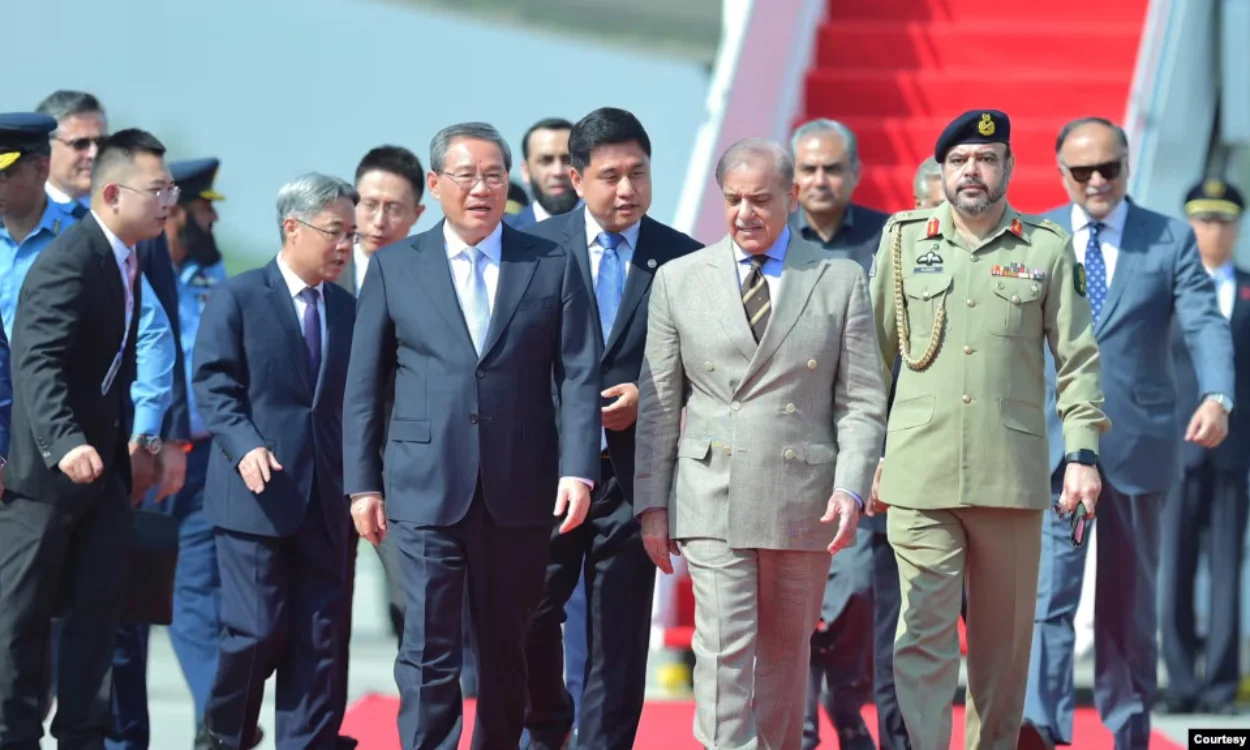Chinese Premier Li Qiang commenced a high-stakes, four-day visit to Pakistan on Monday to discuss bilateral relations, bolster economic ties, and attend the Shanghai Cooperation Organization (SCO) meeting in Islamabad. Amid escalating security concerns following recent attacks on Chinese citizens, Pakistani authorities have imposed strict security measures, underscoring the ongoing challenges faced by Chinese nationals working on projects within the China-Pakistan Economic Corridor (CPEC).
High Alert Amid Security Threats
Pakistan is on high alert following a deadly attack on Chinese workers in Karachi last week, where a suicide bomber targeted a convoy of Chinese engineers, killing two and heightening fears over the safety of foreign workers. Prime Minister Shehbaz Sharif personally received Li at the Noor Khan airbase, signifying the importance of this visit for both nations. The two leaders reviewed bilateral trade relations, with a particular emphasis on CPEC, a critical component of China’s Belt and Road Initiative that has faced ongoing security challenges.
The Pakistani government declared a three-day public holiday in Islamabad and nearby Rawalpindi to maintain “foolproof security” for the SCO summit. Schools, businesses, and public offices were closed as military and paramilitary forces were deployed to ensure Premier Li’s safety.
CPEC Developments and Growing Security Concerns
During delegation-level discussions, Li and Sharif virtually inaugurated the newly built Gwadar International Airport, a CPEC project that highlights China’s ongoing infrastructure investment in Pakistan. Li commended the “iron-clad” friendship between Pakistan and China, while Sharif expressed gratitude for China’s support and pledged to enhance security for Chinese nationals working in the country.
The virtual nature of the inauguration reflects security concerns, as heightened threats prompted authorities to avoid in-person gatherings. In a statement, the Chinese Foreign Ministry called on Pakistan to bolster protective measures, especially after the Karachi attack, which has sparked criticism over Pakistan’s capacity to secure Chinese personnel and assets.
A Potential Turning Point in China-Pakistan Relations?
Mushahid Hussain, head of the Pakistan-China Institute, warned that the recent Karachi attack marks a turning point, describing it as a severe blow to the strategic partnership between the two countries. With at least 21 Chinese citizens killed in militant attacks since 2017, the security risks facing Chinese nationals in Pakistan remain an unresolved issue. The Baloch Liberation Army, a separatist group, claimed responsibility for the Karachi attack, citing opposition to Chinese involvement in Balochistan, where locals claim exploitation of resources.
The Pakistani government, under scrutiny to provide enhanced security, is under significant pressure from Beijing. Diplomatic sources indicated that Chinese officials were “furious” after the Karachi incident and demanded swift justice for the perpetrators.
CPEC’s Uncertain Future Amid Economic and Security Hurdles
China has invested nearly $25 billion in CPEC over the last decade, creating extensive infrastructure networks in Pakistan. However, both economic and security challenges have complicated the project’s trajectory. Husnain Javed, a Beijing-based Pakistani researcher, remarked that debt repayments on CPEC-related infrastructure and increasing security threats have undermined the partnership. “The recent attack,” he said, “is a blow to the trust between China and Pakistan,” underscoring concerns that CPEC’s future could be at risk.
As both nations grapple with these complex challenges, Li’s visit serves as a litmus test for the strength of the China-Pakistan relationship, which now faces intensified scrutiny from both domestic and international observers.


